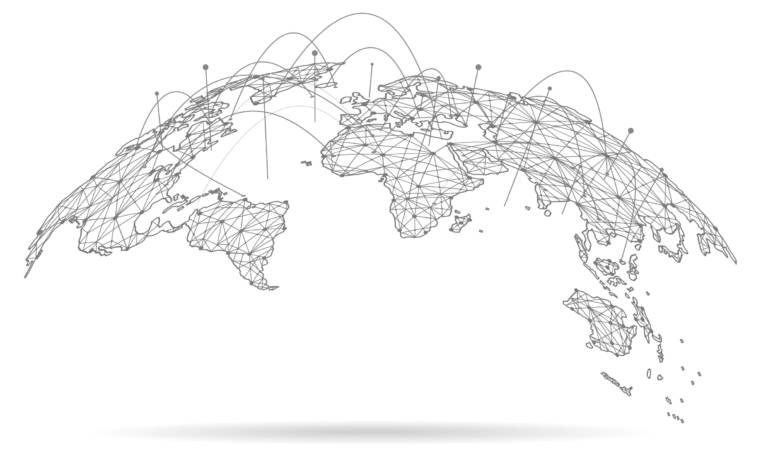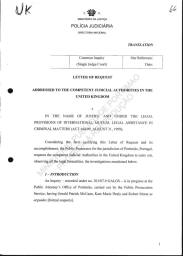How to Effectively Use Letters Rogatory in Cross-Border Legal Situations
How to Effectively Use Letters Rogatory in Cross-Border Legal Situations
Blog Article
Letters Rogatory Explained: Facilitating Legal Participation In Between Countries

Definition of Letters Rogatory
Letters rogatory are official requests made by a court in one territory to a court in another jurisdiction, looking for help in acquiring evidence or testimony for a lawful case. This step-by-step mechanism is necessary in the context of international legislation, where lawful systems might vary, and cross-border collaboration is essential. Letters rogatory facilitate the event of info that might be crucial for adjudicating situations, especially in instances including intricate transnational issues.
Typically, these demands emerge in civil, criminal, or administrative matters where a celebration requires proof that is situated outside the territory of the asking for court. The letters act as a way to make certain that the concepts of due procedure are upheld, allowing courts to gain access to proof that could or else stay hard to reach due to geographic or legal barriers.
Making use of letters rogatory is regulated by worldwide treaties, bilateral agreements, or domestic laws, which delineate the procedures and obligations of the courts involved. It is essential to note that the execution of such requests is not assured; they depend upon the laws and techniques of the territory getting the letter. Therefore, letters rogatory are a crucial device for promoting legal collaboration and guaranteeing justice across borders.
The Refine of Issuing Letters Rogatory
Issuing letters rogatory entails a structured procedure that ensures conformity with both international and residential lawful requirements. The asking for celebration, generally a court or lawful authority, composes an official demand detailing the nature of the aid looked for, the proof or info needed, and the lawful basis for the request. This record has to be specific to assist in understanding by the foreign territory.

The next step involves transmitting the letters rogatory to the designated foreign authority. This is commonly done with diplomatic channels or global lawful aid frameworks, guaranteeing that the request is obtained and recognized by the international court. The foreign court then refines the demand according to its very own lawful procedures, ultimately reacting to the asking for party with the popular information or proof, therefore helping with worldwide legal cooperation.
Relevance in International Regulation
The importance of letters rogatory in international law can not be overemphasized, as they function as an important mechanism for judicial participation across boundaries. These formal ask for support in lawful matters allow courts in one territory to inquire, evidence, or the existence of witnesses from another territory, thus promoting the management of justice in multinational cases.
Letters rogatory are especially important in the context of globalization, where lawful conflicts often extend several nations. They enable the collection of proof that might otherwise be inaccessible, making sure that lawful procedures are educated and fair. By cultivating collaboration between judicial systems, letters rogatory aid copyright the regulation of regulation and promote shared regard amongst countries.
Moreover, making use of letters rogatory shows a dedication to international standards and concepts of cooperation, showing the interconnected nature of modern-day lawful techniques. It shows the relevance of adhering to well-known treatments go to my blog and treaties, such as the Hague Convention, which provides a framework for these requests - Letters rogatory. Inevitably, letters rogatory boost the effectiveness of lawful processes, guaranteeing that justice is not impeded by geographical borders
Obstacles and Limitations
In spite of their importance, letters rogatory face several difficulties and restrictions that can impede their efficiency. One main concern is the differing lawful frameworks and procedures across jurisdictions, which can cause misconceptions and hold-ups in the execution of requests. Different countries might have distinctive demands for the credibility of letters rogatory, making complex the procedure additionally.
Additionally, the commonly drawn-out nature of global lawful participation can hinder timely access to evidence or witnesses. This delay may negatively influence recurring examinations or lawful process, specifically in situations needing immediate original site action. Furthermore, the lack of resources and training in some jurisdictions can cause not enough handling of demands, causing incomplete or inadequate feedbacks.
Nations with less formal legal systems might struggle to conform with the procedural rigor expected in letters rogatory. These difficulties require constant discussion and reform to boost the effectiveness of letters rogatory in lawful cooperation.
Situation Researches and Examples

Alternatively, obstacles can occur, as seen in an instance including a European country looking for proof in an ongoing criminal issue from a non-EU country - Letters rogatory. The procedure was postponed due to governmental hurdles and differing legal requirements, inevitably hindering the investigation
These instances highlight that while letters rogatory can facilitate international teamwork and quicken lawful proceedings, they likewise highlight the requirement for clear communication and understanding of lawful structures in between nations. Such study underscore the relevance of refining this tool to improve efficiency and efficiency in global legal matters.
Final Thought
In summary, letters rogatory offer as a you could try these out vital system for facilitating lawful teamwork between nations, making certain the collection of proof and statement throughout territories. Their importance in international legislation can not be overemphasized, as they promote due procedure and improve the efficiency of cross-border legal process.
Letters rogatory are official requests made by a court in one territory to a court in another territory, looking for help in obtaining proof or statement for a lawful proceeding. The asking for party, generally a court or legal authority, drafts a formal request outlining the nature of the assistance looked for, the evidence or info needed, and the lawful basis for the request. The foreign court after that processes the demand according to its very own lawful procedures, eventually reacting to the requesting celebration with the sought-after information or evidence, hence facilitating global legal teamwork.
Moreover, the use of letters rogatory shows a dedication to global norms and concepts of participation, showing the interconnected nature of modern-day legal methods.Global legal collaboration via letters rogatory is not without its real-world effects, as shown by numerous instance studies that highlight both successes and difficulties.
Report this page